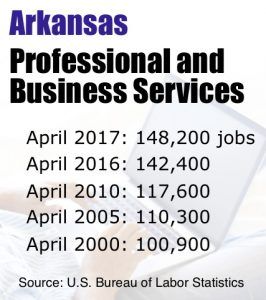Professional and business services supersector driving labor gains in Arkansas
by June 1, 2017 2:52 pm 450 views

The late April grand opening of the Little Rock Tech Park and Apptegy’s lockdown of $5.7 million in new financing this week confirms recent U.S. Labor Department data that Arkansas’ professional and business services supersector is experiencing a growth spurt that is attracting higher-paying white collar jobs to the Natural State.
However, that same sector also includes a wide range of businesses placing want ads for lower-paying janitorial jobs and temporary positions that tend to be on the blue collar end of the job market, U.S. Bureau of Labor Statistics data shows.
Michael Pakko, chief economist at the University Arkansas at Little Rock’s Institute for Economic Advancement, told Talk Business & Politics it is difficult to follow where most growth is taking place in the fast-growing sector because of the wide range of jobs included in the U.S. Bureau of Labor Statistics’ (BLS) tracking of labor market data.
“Professional and Business Services is a supersector that is difficult to pin down. It includes a fairly wide array of activities,” he said. “This has been a rather data-intensive way of saying that growth in the … (sector) includes many dimensions.”
According to recent data compiled by BLS, there has been a 4% increase statewide in the number of new hires in the professional and business services sector between April 2016 and today, pushing the state’s jobless rate down to all-time record of 3.5%. That same trend also bolstered the U.S. labor market, which dropped to a 4.4% jobless rate in April.
Under the so-called NAICS, or North American Industry Classification System established in 1997 to replace the former Standard Industrial Classification system, the federal government is able to classify and uniformly compare data from the different sectors of the U.S. economy.
Arkansas’ goods-producing industries include the manufacturing, mining and construction “supersectors,” which provide most of the state’s blue collar jobs. However, the now larger service-producing sector includes most of the faster-growing service-oriented “supersectors,” including the trade, transportation and utilities industry that employed the largest number of Arkansas workers at 253,700 at the end of April.

STARTUP JOBS ADD HIGH-SKILLED WORKERS TO STATE ECONOMY
In his analysis of several years of BLS data, Pakko said an average of 4,780 professional and business service jobs were added to the state’s economy between 2012 and 2016. The UALR economist said the professional and technical services industry has grown steadily and now accounts for nearly a quarter of the growth in the professional and business services supersector.
“These jobs are in specialized sectors and tend to require highly skilled employees,” Pakko added.
Some of that growth is highlighted by recent activity in the state’s startup community, where several key events have taken place over the past few months that could further the momentum. Earlier this week, Apptegy received a $5.7 million investment from Five Elms Capital of Kansas City for the Little Rock startup’s Thrillshare platform, a digital content sharing framework used in hundreds of K-12 schools in 38 states.
“Apptegy plans to use the funding from Five Elms for sales and marketing efforts for Thrillshare, in addition to the development of other products,” Apptegy’s CEO Jeston George said in a news release. “Five Elms brings not only financial and strategic support, but decades of operating experience to guide us as we scale.”
Ahead of the grand opening of the Little Rock Technology Park on April 24, Executive Director Brent Birch said there is a “buzz” of new entrepreneurial activity in the city.
“Since the facility opened March 1, I wouldn’t say there has been this mad rush of people coming out of the woodwork and gobbling up space in the tech park, but there are steady visits of three or four times a week where someone wants to see the (offices) … and is considering setting up shop here,” Birch told Talk Business & Politics. “They wanted to see it, experience it and touch it. That has been a big driver, just being open.”
In addition, the Little Rock Venture Center announced four weeks ago that 10 companies had been chosen to participate in the city’s second 2017 FinTech Accelerator program. The Venture Center, also housed in the Tech Park’s new facility, held a kickoff event May 10 that was attended by Gov. Asa Hutchinson, U.S. Rep. French Hill, R-Little Rock, and Fidelity Information Services President and CEO Gary Norcross.
GOV. HUTCHINSON SUPPORTS STATE’S EMERGING TECH SECTOR
Gov. Asa Hutchinson has been one of the biggest boosters of the state’s startup and technology sector. Two months ago, during the legislative session, the governor continued his administration’s efforts to boost the state’s computer sciences field with the formation of the Blue Ribbon Commission to Report on the Economic Competitiveness of Computing and Data Analytics in Arkansas.
The Commission, to be co-chaired by former Acxiom Corp. Chairman and CEO Charles Morgan and State Economic Development Chief Mike Preston, is tasked to study opportunities to grow the sector of Arkansas’ economy associated with computer science and data analytics. The task force will produce a report, due this fall, that addresses three issues: business challenges in computing and data analytics; potential application niche areas for Arkansas to build excellence and depth in computing and data analytics; and skill needs and challenges of Arkansas’ talent pipeline.
“This esteemed group of Arkansans, through their expertise and guidance, will allow the state to address the opportunities and obstacles we must address to create an environment in which our technology sector can thrive,” Hutchinson said. “This is the next step in growing the computer coding initiative as it will allow our higher education institutions and workforce development agencies to address the specific needs of Arkansas companies in the computer science and data analytics sector.”
The governor’s computer science push during the 2017 session also included several AEDC-supported bills that were signed into law to support startups and knowledge-based tech companies. Senate Bills 248, 249 and 250, sponsored by Sen. David Sanders, R-Little Rock, were signed into law by Hutchinson on Feb. 16. Those three bills are aimed at boosting AEDC efforts to attract and accelerate the growth of high-paying knowledge-based, high-tech companies, startups and small businesses involved in innovative research to Arkansas.
SB250, now Act 165 of 2017, created the “Arkansas Business and Technology Accelerator Act.” Under this proposal, AEDC’s division of Science and Technology will create a state-supported startup immersion program designed to help local companies and entrepreneurs commercialize their business ideas and concepts.
While Hutchinson’s efforts are aimed at boosting startup and technology jobs, Pakko’s analysis notes that Northwest Arkansas has accounted for more than 60% of the statewide growth in the professional and business services supersector over the past five years. Of the nearly 20,000 new sector jobs added to the state’s economy between April 2012 and April 2017, the Fayetteville-Springdale-Rogers metropolitan area added 12,400 of those positions. By comparison, central Arkansas added only 2,500 jobs in the sector, while the Fort Smith metro area accounted for 600 new hires.
